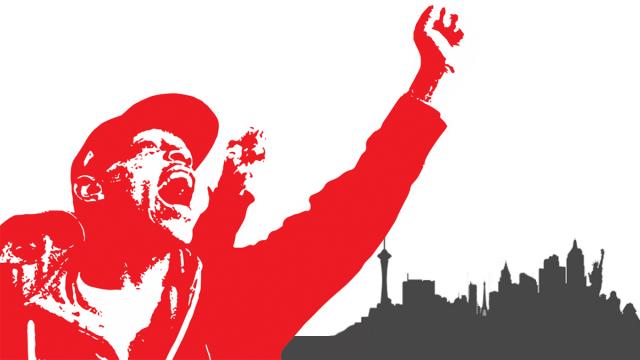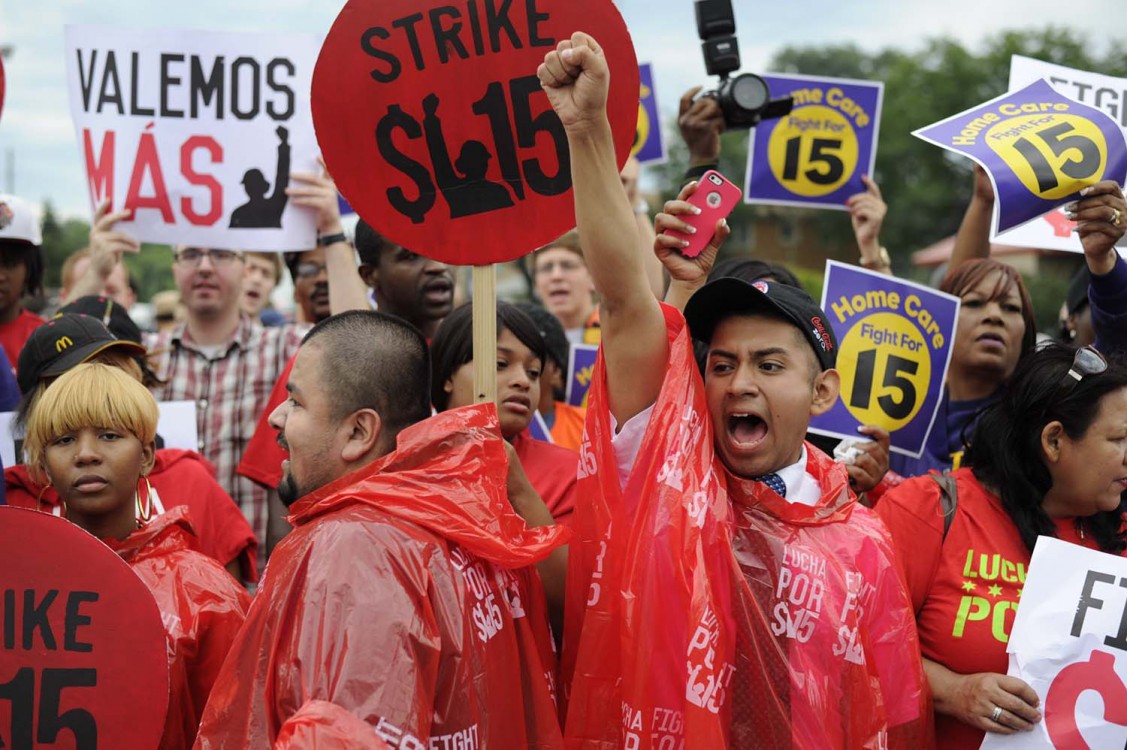
MEMPHIS — The Fight for $15 and the Movement for Black Lives will take to the streets nationwide April 4 – the anniversary of Dr. Martin Luther King Jr.’s assassination – in a two-dozen-city “Fight Racism, Raise Pay” protest.
Thousands of underpaid workers, local racial justice activists, elected officials and clergy will hold rallies, marches, teach-ins, and other demonstrations to stress that the push for economic and racial justice remains as deeply linked today as when Dr. King was killed in 1968 supporting striking black sanitation workers in Memphis, Tenn. The coast-to-coast protests will culminate in a march by thousands of workers, national civil rights leaders and politicians on the Lorraine Motel in downtown Memphis, where they’ll hold a memorial at the site of Dr. King’s assassination 49 years ago.
The “Fight Racism, Raise Pay” protests, planned for more than two-dozen cities from Atlanta to Milwaukee to Las Vegas, come as working Americans face an onslaught of attacks on their right to join together for higher pay and confront racist policies from the White House down to local police departments. Republican lawmakers in more than two-dozen states have introduced legislation aimed at cracking down on protestors like those in the Fight for $15 and the Movement for Black Lives.
The marchers will converge in Memphis weeks after a local Fight for $15 worker organization filed a federal civil rights lawsuit against the city, charging its police department with widespread illegal surveillance and intimidation to stifle worker protest. Rallies on April 4 in Minneapolis, Detroit and Durham will condemn anti-protest legislation proposed by lawmakers in those states.
“We’re joining together with the Movement for Black Lives because our two movements have a common bond in fighting the racism that keeps down people of color everywhere,” said Latierika Blair, 23, who works at McDonald’s in Memphis, Tenn., and is paid $7.35/hour. “McDonalds conspires with police to try to silence us when we speak out for higher pay. Corporations and politicians act to keep workers and black people from getting ahead in America. We should be investing in our people and communities. That’s why we have to protest, and that’s why we will keep speaking out together until we win.”
The April 4 protests come as newly empowered corporate interests and right-wing politicians attempt to strip away the rights of workers to organize across the country. Union jobs in state and local government – which have historically provided a pathway to the middle class for workers of color – are under attack from corporate-backed politicians like Illinois Gov. Bruce Rauner, who has refused to bargain a contract with state employees for nearly two years in an effort to break their union. And people of color remain over-represented in low-paying industries like fast-food: more than half of black workers and nearly 60 percent of Latino workers are paid less than $15, according to an analysis by the National Employment Law Project.
“White supremacy and corporate greed have always been linked in America,” said Chelsea Fuller of the Movement for Black Lives. “The fast-food workers who are going on strike for $15/hour and the right to a union are resisting the same institutional racism and oppression that fuels police violence across the country. We are stronger when we stand together, and so our movements are going to keep fighting back against the twin evils of racial and economic inequality that continue to hold back black and brown people.”
The April 4 protests are the latest wave of defiance against reactionary attacks on working people, people of color, women and immigrants. Just weeks after the November 2016 election, thousands of workers in the Fight for $15 walked off the job from coast to coast and engaged in waves of civil disobedience. The walkouts marked the start of a new era of mass demonstration, including the Women’s March and a rash of protests at the nation’s airports following President Trump’s announcement of an immigration ban from predominantly Muslim countries. The April 4Fight for $15/Movement for Black Lives protests will kick off a wave of protests around the country in the following weeks, including demonstrations calling attention to immigrants’ rights, climate change and tax policy that benefits the rich.
Dr. King saw a common bond between the labor and civil rights movements and believed that union rights were fundamental to achieving racial justice. As King said in 1961, “the two most dynamic and cohesive liberal forces in the country are the labor movement and the Negro freedom movement. Together we can be architects of democracy.”
“Dr. King spent his final days standing with Memphis sanitation workers because he saw the deep link between the labor movement and the civil rights movement,” said the Rev. William Barber II, founder of the social justice organization Repairers of the Breach. “Dr. King knew that if the racism and poverty are inextricably linked, our struggles to confront them must be inseparable as well. On April 4, we follow in Dr. King’s footsteps to march on Memphis and take on the twin scourges of racial and economic inequality.”
The April 4 actions will conclude with a national moment of silence at 6:01pm Central – the exact time of Dr. King’s assassination – when Americans across the country will reflect on Dr. King’s dream for racial and economic justice and how it connects to theirs.
Racial justice organizations participating in actions on April 4 include Black Lives Matter chapters in Los Angeles, Calif., Atlanta, Ga., Broward County, Fla., Hillsborough County, Fla., Chicago, Ill., and Flint, Mich.; NAACP chapters in Missouri, North Carolina, Virginia and Las Vegas, Nev., and other groups including Black Youth Project 100 and Workers Center for Racial Justice in Chicago, and Dream Defenders in Tampa and Miami.
The Fight for $15 has built deep ties with civil rights groups and leaders across the country. U.S. Rep. John Lewis joined Atlanta fast-food workers on a strike line in August 2013, encouraging them to, “Keep walking, keep marching, keep talking, keep pushing.” In the summer of 2014, the NAACP passed a resolution backing the Fight for $15; in the winter of 2015 Memphis sanitation workers who participated in the 1968 strike in Memphis, during which Dr. Martin Luther King Jr. was assassinated, implored a gathering of fast-food workers at Dr. King’s church in Atlanta to keep fighting for $15 and union rights; and faith leaders of all stripes have echoed the workers’ moral argument for dignity on the job. Workers have developed deep ties with the Movement for Black Lives and marched alongside activists calling for racial justice from Ferguson, Mo. to Baton Rouge, La, to Milwaukee, Wisc.
The Fight for $15 has spurred wage hikes for 22 million underpaid workers, including more than 10 million who are on their way to $15/hour, by convincing everyone from voters to politicians to corporations to raise pay. Workers have taken what many viewed as an outlandish proposition – $15/hour– and made it the new labor standard in New York, California, Seattle and Washington, D.C. Home care workers in Massachusetts and Oregon won $15/hour statewide minimum wages and companies including Facebook, Aetna, Amalgamated Bank, JP Morgan Chase and Nationwide Insurance have raised pay to $15/hour or higher. Workers in nursing homes, public schools and hospitals have won $15/hour via collective bargaining. The movement was credited as one of the reasons wages for lower-paid workers grew faster than for upper-income workers last year, marking a significant break with the runaway wage growth captured by wealthy Americans over the past several decades.
“Every day workers of color across this country face deep-seated racism that would seem to be out of Dr. King’s era, but is, sadly, still reality today,” said Kendall Fells, national organizing director of the Fight for $15. “But workers and activists are standing up and speaking out, the way Dr. King would, to fight racism and raise wages, and we are not giving up until companies like McDonald’s get the message that workers are worth more than minimum wage.”
3 WAYS TO SHOW YOUR SUPPORT
- Log in to post comments














